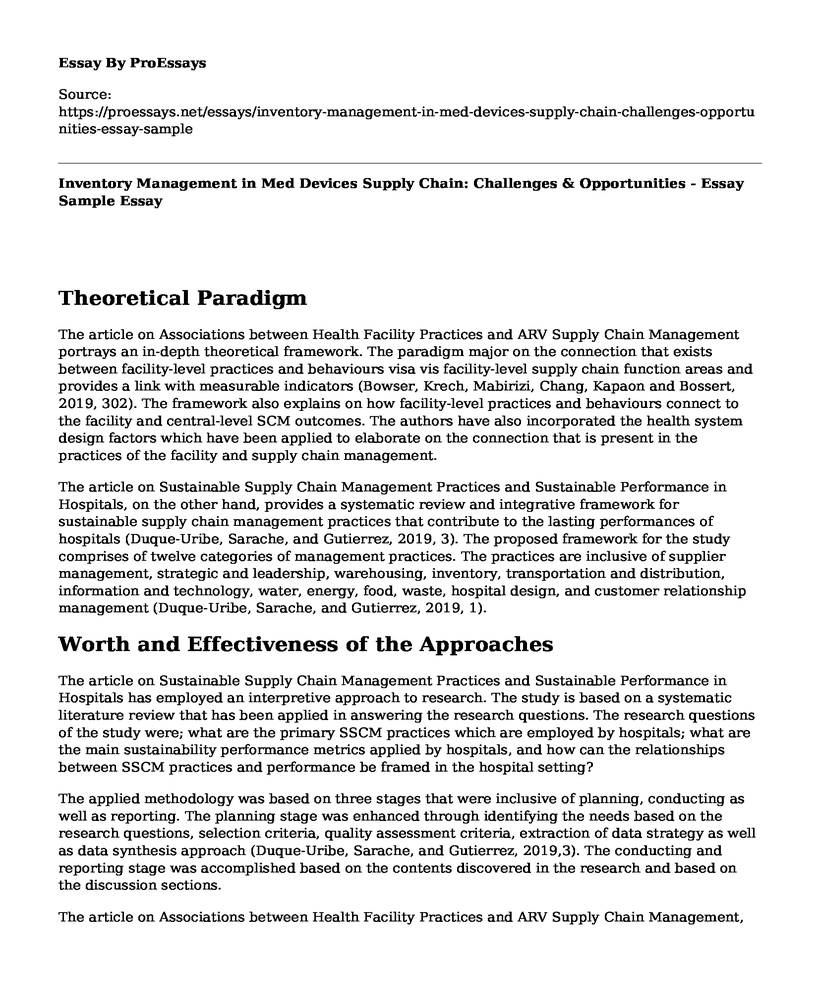Theoretical Paradigm
The article on Associations between Health Facility Practices and ARV Supply Chain Management portrays an in-depth theoretical framework. The paradigm major on the connection that exists between facility-level practices and behaviours visa vis facility-level supply chain function areas and provides a link with measurable indicators (Bowser, Krech, Mabirizi, Chang, Kapaon and Bossert, 2019, 302). The framework also explains on how facility-level practices and behaviours connect to the facility and central-level SCM outcomes. The authors have also incorporated the health system design factors which have been applied to elaborate on the connection that is present in the practices of the facility and supply chain management.
The article on Sustainable Supply Chain Management Practices and Sustainable Performance in Hospitals, on the other hand, provides a systematic review and integrative framework for sustainable supply chain management practices that contribute to the lasting performances of hospitals (Duque-Uribe, Sarache, and Gutierrez, 2019, 3). The proposed framework for the study comprises of twelve categories of management practices. The practices are inclusive of supplier management, strategic and leadership, warehousing, inventory, transportation and distribution, information and technology, water, energy, food, waste, hospital design, and customer relationship management (Duque-Uribe, Sarache, and Gutierrez, 2019, 1).
Worth and Effectiveness of the Approaches
The article on Sustainable Supply Chain Management Practices and Sustainable Performance in Hospitals has employed an interpretive approach to research. The study is based on a systematic literature review that has been applied in answering the research questions. The research questions of the study were; what are the primary SSCM practices which are employed by hospitals; what are the main sustainability performance metrics applied by hospitals, and how can the relationships between SSCM practices and performance be framed in the hospital setting?
The applied methodology was based on three stages that were inclusive of planning, conducting as well as reporting. The planning stage was enhanced through identifying the needs based on the research questions, selection criteria, quality assessment criteria, extraction of data strategy as well as data synthesis approach (Duque-Uribe, Sarache, and Gutierrez, 2019,3). The conducting and reporting stage was accomplished based on the contents discovered in the research and based on the discussion sections.
The article on Associations between Health Facility Practices and ARV Supply Chain Management, on the other hand, has employed the use of the positivist approach of research. The methodology is based on four phases that incorporate review of literature, country and health facility selection and survey instrument development, in-country data collection, and data synthesis and analysis (Bowser, Krech, Mabirizi, Chang, Kapaon and Bossert, 2019, 301).
The study has identified that indeed there exist gaps in the measurement of practices at the facility level and behaviours in the ARV supply chain (Bowser, Krech, Mabirizi, Chang, Kapaon, and Bossert, 2019, 314). Based on the results, thirty practices of the facility level were identified and associated with SCM. However, out of the thirty, fifteen were captioned to lack an indicator of measurement from the research. The study further proposes new indicators based on the analysis obtained from in-country qualitative, and it provides insight into the manner in which the supply chains are managed.
Based on the analysis of both methodologies, it is evident that they are both ideals in answering the research questions. However, the positivist approach tends to be better off compared to the interpretive approach. The method has provided an in-depth analysis of research and has further provided a proposal of new indicators to aid in understanding the gaps that are prevalent in the measurement of practices at the facility level.
Intended Methodology
The proposed research question in my case is based on the challenges and opportunities of inventory management within a medical device's supply chain and its impact on the public healthcare 'end-customer': case study - Ability Matters." The proposed research question can be dealt with through the incorporation of both the interpretive and positivist approach. The interpretive approach will be ideal in answering the challenges and opportunities that are present in inventory management. The positivist approach, on the other hand, will be ideal in providing an analysis based on the impact of these issues on public health care. The positivist approach will also be suitable for answering the research questions based on the challenges and opportunities present in the supply chain of medical devices. Therefore I will adopt the use of the positivist approach in conducting my research.
References
Bowser, D., Krech, L., Mabirizi, D., Chang, A.Y., Kapaon, D., and Bossert, T., 2019. Associations between Practices and Behaviors at the Health Facility Level and Supply Chain Management for Antiretrovirals: Evidence from Cameroon, Namibia, and Swaziland. Global Health: Science and Practice, 7(2), pp.300-316.
Duque-Uribe, V., Sarache, W., and Gutierrez, E.V., 2019. Sustainable Supply Chain Management Practices and Sustainable Performance in Hospitals: A Systematic Review and Integrative Framework. Sustainability, 11(21), p.1-30.
Cite this page
Inventory Management in Med Devices Supply Chain: Challenges & Opportunities - Essay Sample. (2023, Apr 03). Retrieved from https://proessays.net/essays/inventory-management-in-med-devices-supply-chain-challenges-opportunities-essay-sample
If you are the original author of this essay and no longer wish to have it published on the ProEssays website, please click below to request its removal:
- Emergency Management COOP Analysis
- Vaccine Controversy Effect on Nurses Essay
- Paper Example on Brainstorming Technique
- Student's Learning Disabilities in the Class Paper Example
- Data 101: A Tutorial on Organizing and Retrieving Data - Research Paper
- Deadliest Flu Pandemic: The Spanish Flu of 1918 - Essay Sample
- Essay Example on Army Leaders: Courage, Sacrifice, and Loyalty







